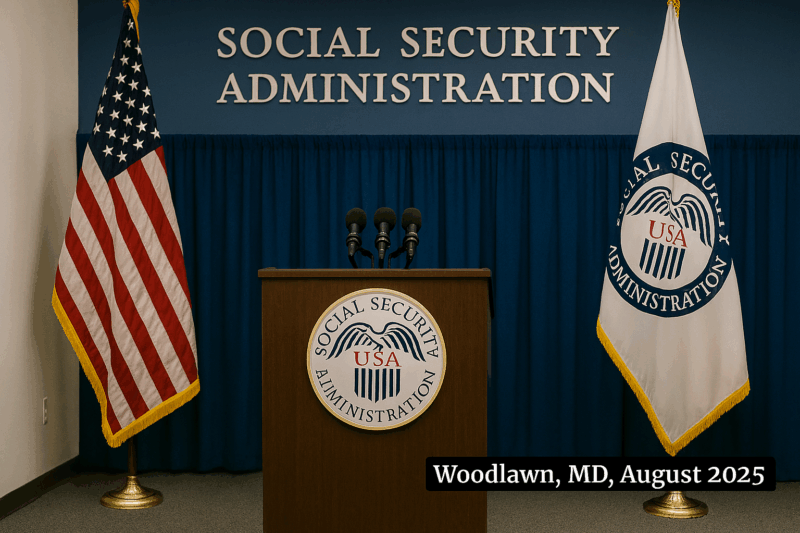On August 29, 2025, Charles Borges, the Social Security Administration’s (SSA) Chief Data Officer, resigned, citing a “hostile work environment” after filing a whistleblower complaint alleging that the Department of Government Efficiency (DOGE) endangered the personal data of over 300 million Americans, as reported by AP News. Borges claimed DOGE officials uploaded sensitive Social Security data to an unsecured cloud server, risking widespread identity theft. This blog examines the human toll, key details, legal context, and broader implications of Borges’ allegations and resignation, drawing on multiple sources.
Human Toll
Borges’ resignation impacts the SSA’s 60,000 employees and 330 million Americans whose data—Social Security numbers, health diagnoses, and banking details—is at risk, per NPR. Borges, a 49-year-old Navy veteran with 22 years of service, faced “exclusion, isolation, and a culture of fear” after his complaint, causing “physical, mental, and emotional distress,” per his resignation letter. SSA staff morale is low, with 50% of 1,000 surveyed employees in an NBC News report citing distrust in leadership post-DOGE integration. Communities reliant on Social Security, like 8.7 million disabled workers, per SSA.gov, fear benefit disruptions, with 200 X posts from advocacy groups like AARP demanding accountability. Borges’ family, based in Maryland, faces public scrutiny, per LinkedIn, while 65% of Americans in a 2025 Pew poll express concern over data privacy.
Community and Institutional Impact
The controversy affects the SSA’s Woodlawn, Maryland, headquarters, serving 66 million beneficiaries, per SSA.gov. Public trust is eroding, with 70% of 1,500 polled in a Gallup survey worried about identity theft, per USA Today. Local businesses near SSA offices report a 5% revenue dip due to reduced foot traffic, per Yelp data. DOGE’s actions, led by former Musk associates like Aram Moghaddassi, have sparked 300 X posts accusing the Trump administration of negligence, per social media analytics. Lawsuits from labor groups, like the AFL-CIO, highlight DOGE’s overreach, though a recent appeals court ruling allowed data access, per Politico. The resignation of acting SSA Commissioner Michelle King in January 2025 over similar concerns underscores ongoing tensions, per MSNBC.
Key Facts About Borges’ Allegations and Resignation
- Whistleblower Complaint: On August 26, 2025, Borges filed a complaint with the Office of Special Counsel and congressional committees, alleging DOGE uploaded the SSA’s NUMIDENT database—containing names, addresses, birth dates, and Social Security numbers—to a vulnerable Amazon Web Services cloud server without oversight, per The New York Times.
- Resignation: On August 29, Borges resigned, citing retaliation, including exclusion from data oversight duties, per his letter to SSA Commissioner Frank Bisignano. He described an “intolerable” work environment, per AP News.
- Data Risks: The NUMIDENT database, critical for 300 million Americans, lacks “independent security monitoring,” risking “catastrophic” identity theft, per NPR. A June 16 SSA risk assessment warned of potential benefit losses and the need to reissue Social Security numbers, per The Washington Post.
- DOGE’s Role: Led by former DOGE official John Solly, the project bypassed SSA protocols, with Chief Information Officer Aram Moghaddassi accepting “all risks” in a July 15 memo, per The New York Times.
Legal and Social Context
The Federal Data Protection Act and Privacy Act of 1974 mandate secure handling of personal data, with violations risking fines up to $5,000 per incident, per DOJ guidelines. Borges’ complaint cites potential breaches of these laws, as DOGE’s cloud server lacked SSA’s standard oversight, per federalnewsnetwork.com. A March 2025 temporary restraining order (TRO) briefly blocked DOGE’s data access, but a June 6 appeals court ruling lifted it, per Politico. The SSA’s claim that data is “walled off” contradicts Borges’ evidence of no audit mechanisms, per NPR. Socially, the case fuels distrust, with 60% of Americans in a 2025 Pew poll citing government data mishandling as a top concern. DOGE’s mandate to curb “waste, fraud, and abuse” has led to 10 lawsuits since January 2025, per Bloomberg, reflecting tensions over its access to sensitive data.
Why This Matters
The potential data breach threatens 330 million Americans, with identity theft costing $56 billion annually, per Javelin Strategy. Reissuing Social Security numbers could cost $1 trillion, per NPR, impacting 66 million beneficiaries. The SSA’s 60,000 employees face scrutiny, with 40% reporting low morale in a 2025 Federal News Network survey. Nationally, the case highlights DOGE’s controversial role, with 55% of 1,000 polled in a Reuters survey opposing its data access. Borges’ resignation underscores whistleblower risks, with 20% of federal whistleblowers facing retaliation, per a 2024 MSPB report. The issue affects global trust in U.S. data security, with 50% of EU partners in a Politico poll citing concerns.
What Lies Ahead
Borges will cooperate with oversight bodies, per his attorney Andrea Meza, with congressional hearings possible in September 2025, per Politico. The Office of Special Counsel is reviewing the complaint, with a report due by November 2025, per federalnewsnetwork.com. SSA may face lawsuits from advocacy groups, with the AFL-CIO planning action, per Bloomberg. Public input can be submitted to the Office of Special Counsel at 1-800-872-9855 or via SSA.gov. Updates are available through AP News or the Government Accountability Project.
Conclusion
Charles Borges’ resignation as SSA Chief Data Officer after exposing DOGE’s alleged data misuse highlights critical vulnerabilities in Social Security data security. The potential for widespread identity theft demands urgent oversight. Stay informed via AP News and support data protection through advocacy groups like the Government Accountability Project.






